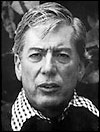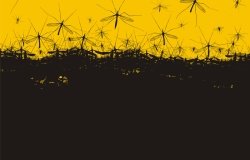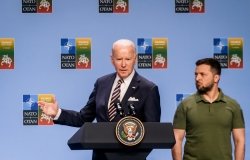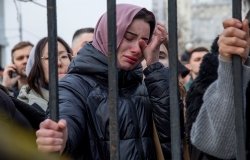Former Fellows and Literary Giants Lewis, Sciolino, and Vargas Llosa Make Headlines
Three former Wilson Center fellows, David Levering Lewis, (Fellows Class of 1990), Elaine Sciolino (Fellows Class of 1998), and Mario Vargas Llosa, (Fellows Class of 1980) are each considered to be among the greatest writers of the late 20th Century. Each has made headlines in recent weeks.
Author David Levering Lewis Wins Second Pulitzer Prize
 David Levering Lewis came to the Center in 1980 to begin work on a biography of the black intellectual W.E.B. Dubois, saying in his original Wilson Center project description, "I would contend that this protean life is one of the last epic American lives remaining to be written." He went on to dedicate 15 years of his life to the project which required some 200 interviews, extensive travel across the United States, the former Soviet Union, Eastern Europe, Africa and Mexico, and finally would win him two Pulitzer Prizes.
David Levering Lewis came to the Center in 1980 to begin work on a biography of the black intellectual W.E.B. Dubois, saying in his original Wilson Center project description, "I would contend that this protean life is one of the last epic American lives remaining to be written." He went on to dedicate 15 years of his life to the project which required some 200 interviews, extensive travel across the United States, the former Soviet Union, Eastern Europe, Africa and Mexico, and finally would win him two Pulitzer Prizes.
While at the Center, he worked on volume one of the biography, W.E.B. Du Bois: Biography of a Race 1868-1919 for which he won not only the Pulitzer, but the Parkman and Bancroft prizes, and was a finalist for The National Book Award and The National Book Critics Circle Award. This first volume follows Du Bois' life from his birth in Great Barrington, Massachusetts, to his role in founding the NAACP in 1910.
"It sounds awesome, and to tell you the truth, I could have added another 50 pages," says Lewis of his newly released 715-page volume, W.E.B. Du Bois: The Fight for Equality and the American Century, 1919-1963 (Henry Holt). The book, volume two of the biography, traces the second half of the life of William Edward Burghardt Du Bois—activist, historian, scholar, sociologist, co-founder of the National Association for the Advancement of Colored People (NAACP) and the leading proponent of the civil rights movement—until his death at age 95.
In addition to the biography, Mr. Lewis is the author of several acclaimed books including King: A Biography, When Harlem Was in Vogue, and The Race to Fashoda: European Colonialism and African Resistance in the Scramble for Africa.
David Levering Lewis is currently the Martin Luther King, Jr., Professor in the history department at Rutgers University.
New York Times Reporter and Author Elaine Sciolino Is Awarded the Bernstein Award
 Elaine Sciolino, a reporter in the Washington bureau of The New York Times, has been named the winner of the 2001 New York Public Library Helen Bernstein Book Award for Excellence in Journalism. The $15,000 prize was awarded for Persian Mirrors: The Elusive Face of Iran (Free Press), the book she was writing while in residence at the Wilson Center during the winter of 1998-99. This award recognizes journalists for drawing public attention to important issues.
Elaine Sciolino, a reporter in the Washington bureau of The New York Times, has been named the winner of the 2001 New York Public Library Helen Bernstein Book Award for Excellence in Journalism. The $15,000 prize was awarded for Persian Mirrors: The Elusive Face of Iran (Free Press), the book she was writing while in residence at the Wilson Center during the winter of 1998-99. This award recognizes journalists for drawing public attention to important issues.
According to The Iranian, "No American reporter has more experience covering Iran or more access to the private corners of Iranian society than Elaine Sciolino." As a correspondent for Newsweek and The New York Times, she reported on the key events of the past two decades. She was aboard the plane that brought Ayatollah Ruhollah Khomeini to Tehran in 1979; she was there for the Iranian revolution, the hostage crisis, the Iran-Iraq war, the rise of President Mohammad Khatami, and the riots of the summer of 1999.
In Persian Mirrors, Sciolino reveals the reality behind the veil in a nation at once ancient and new. In an engaging and colorful narrative, she describes the contradictions of the Iranian revolution and the new order it created. To read a full description and review of the book, visit Amazon.com.
Writer Mario Vargas Llosa Returns to Washington to Join the Faculty at Georgetown
 Highly acclaimed Latin American novelist and one time Peruvian presidential candidate Mario Vargas Llosa recently accepted a newly endowed chair in the Department of Spanish and Portuguese at Georgetown University. While at the Wilson Center in 1980, Vargas Llosa worked on the manuscript for what would become The War of the End of the World, one of the many works for which he has earned the reputation as one of the earliest pioneers of the 1960s literary movement.
Highly acclaimed Latin American novelist and one time Peruvian presidential candidate Mario Vargas Llosa recently accepted a newly endowed chair in the Department of Spanish and Portuguese at Georgetown University. While at the Wilson Center in 1980, Vargas Llosa worked on the manuscript for what would become The War of the End of the World, one of the many works for which he has earned the reputation as one of the earliest pioneers of the 1960s literary movement.
In this book Vargas Llosa writes about the historic Brazilian messianic movement of Antonio Conselheiro, which flourished in the area of Canudos, Bahia from 1893 until its destruction by Brazilian Federal forces in 1897. According to Vargas Llosa's original Wilson Center project description, "This curious and singular movement, both religious and revolutionary, unleashed a veritable civil war which deeply transformed the Northeast and affected the nature of the entire country."
In addition to being a globally celebrated novelist, Vargas Llosa also happens to be a great teacher, having taught before at Georgetown in 1994 and 1999. He will hold the chair at Georgetown for at least five years, during which he will write in residence and teach two courses a semester. Georgetown is thrilled to have a writer of his caliber on staff. "I can't think of another university in this country that has a professor of this stature in the department," says Thomas Walsh, Georgetown's chair of Spanish and Portuguese.









